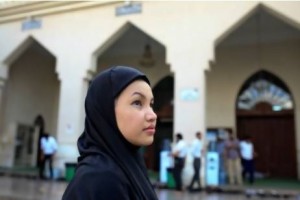Answer
Short Answer: The general description, which occurred partly in Quran and partly in a number of hadiths indicate the following criteria: 1-That it should be covering all the body – most scholars agreed “except for the face and the hands”, (though a few of them went as far as advocating covering face and hands ) 2-That it is loose and not excessively decorated or embroidered beyond accepted social norms. So it shouldn’t be of a non-conventional color, so as to draw the attention to the woman wearing it, and it should not be noticeably transparent. Therefore one may find tens and hundreds of patterns and fashions that correspond with these general directions. To recommend a stereotypical uniform that all Muslim women should abide by, all over the world, since the time of revelation till the present time is not reasonable! That is because what may suit a woman in a tropical region may not suit a woman who lives in the North Pole.
………….
Salam Dear Pamela,
Thank you for your question and for contacting Ask About Islam.
It is true that each Muslim and Muslimah should be keen on having a full understanding of what is halal (legal and permitted) and what is haram (illegal and prohibited). Then, they should try their best to avoid doubtful matters. But, we should be careful not to waste all the valuable time of Muslims in controversial debates.
Of course, I don’t mean at all to undermine the importance of the issue of hijab, but I am against making it an obsession, which leaves no time for other important issues.
Such issues, as to how to release the image of Islam from such distortion, how to invite more people to its humane values, how to be of any help to those wretched brothers and sisters under occupation or how to help new reverts adapt their lives and the lives of their families, are but examples!
Criteria for Muslim Women’s Dress
I am not sure that there has ever been a fixed pattern for the Muslim women’s dress. But, the general description, which occurred partly in Quran and partly in a number of hadiths indicate the following criteria:
1-That it should be covering all the body – most scholars agreed “except for the face and the hands” , (though a few of them went as far as advocating covering face and hands )
2-That it is loose and not excessively decorated or embroidered beyond accepted social norms. So it shouldn’t be of a non-conventional color, so as to draw the attention to the woman wearing it, and it should not be noticeably transparent. Therefore one may find tens and hundreds of patterns and fashions that correspond with these general directions.
To recommend a stereotypical uniform that all Muslim women should abide by, all over the world, since the time of revelation till the present time is not reasonable! That is because what may suit a woman in a tropical region may not suit a woman who lives in the North Pole.
Muslims live in all kinds of climates. Then, what may suit a sister who seldom gets out of her house does not suit a sister who goes out to work, for example in a school or in a kindergarten, with her need to have a simpler style of clothing and so on.
Some sisters prefer to wear a certain style of hijab that the noble ladies of the Prophet’s household used to wear. This is like many of our shi`a sisters, who prefer this black garment (chadore), which was known to be the regular dress of al-sayedah Fatimah, the daughter of the Prophet (peace be upon him).
That is because they feel a great deal of love and loyalty towards her. Some other sisters prefer to imitate the Mothers of the Believers, (wives of the Prophet) in the way they were dressed. That is a garment that hides every bit of their bodies, even the face. Nevertheless, all these types of hijab are chosen voluntary and were not prescribed as a uniform for all Muslim women. 
Do your best in meeting the demands of the proper hijab, which the scholars agree upon. Then, it is up to you if you want to apply such demands on whatever style that may suit your environment. As for any sister who wants to commit herself to a more restricting type of hijab, we pray that Allah would reward her for such keenness and piety.
Still, we appeal to her not to make it an abiding law, for it will either cause other sisters to panic or feel inferior, while actually they are not. The hijab is after all not just a matter of how you look. Proper hijab is as much about the manners you adopt with others, avoiding anything that might be construed as flirting.
One last point I’d like to draw your attention to, as a new revert, is that hijab is not the only issue of Islam where you find a variety of opinions. This is a general feature of Islamic law. This doesn’t indicate – as new Muslims might think – a sign of intellectual chaos. On the contrary, Islamic law is deliberately open to a range of interpretations so as to fit the different mentalities and cultural backgrounds of Muslims.
Thus, having different opinions regarding any issue, including hijab, should not make you feel uncomfortable.
Salam and please keep in touch.
(From Ask About Islam archives)
Please continue feeding your curiosity, and find more info in the following links:
